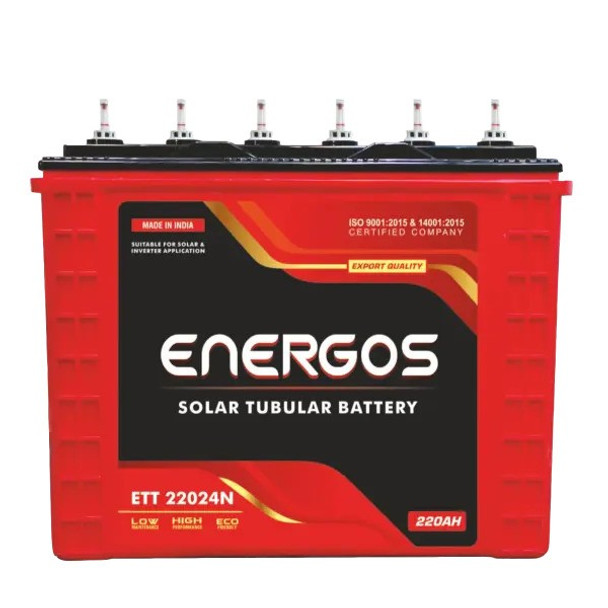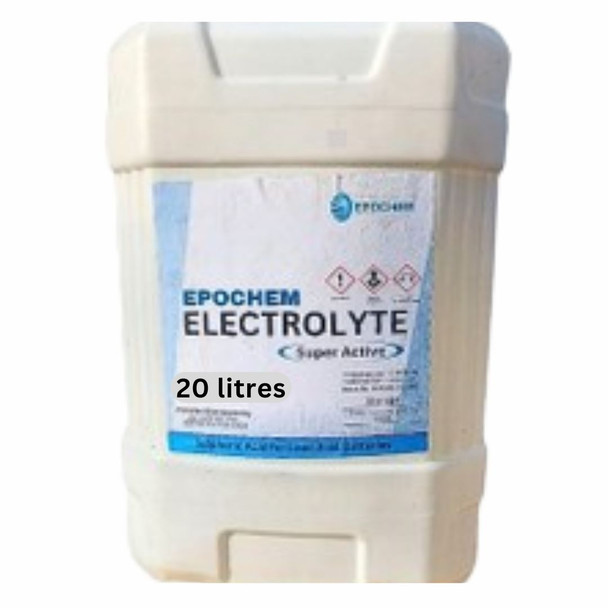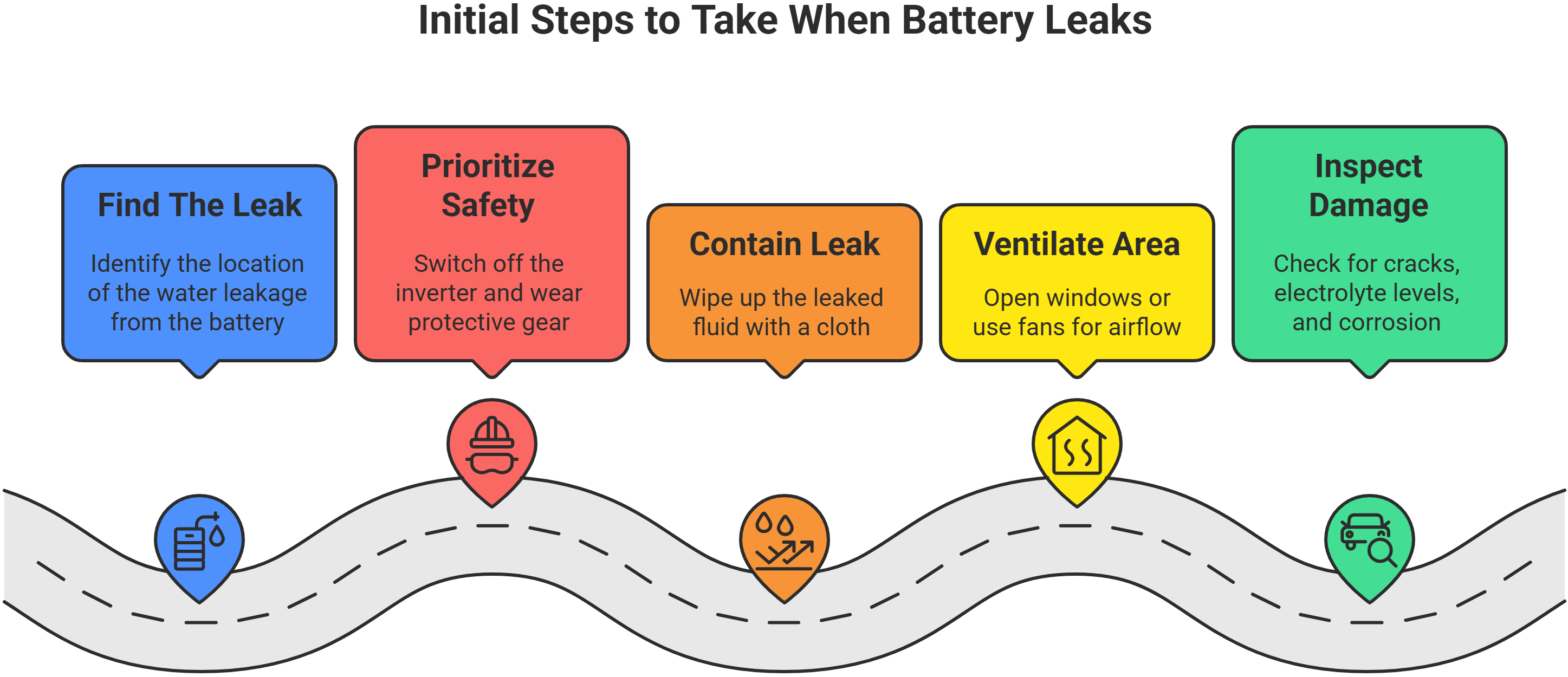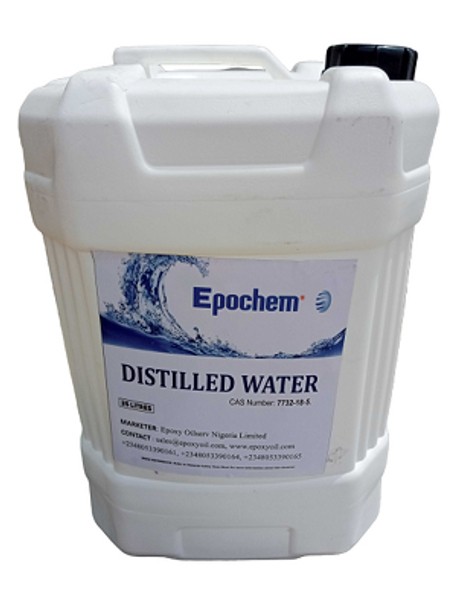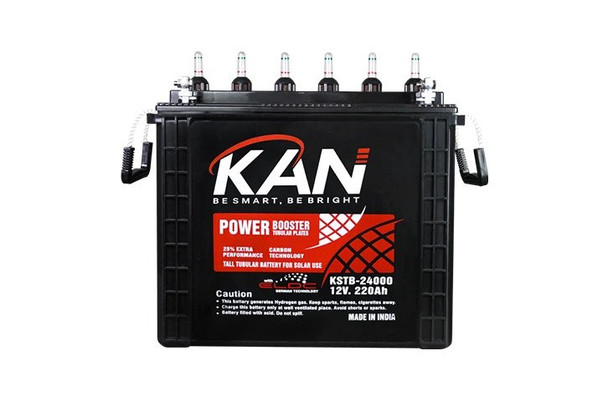My Inverter Battery is Leaking Water: What Should I Do?
Introduction
Inverter batteries are a critical component of power backup systems, ensuring uninterrupted electricity during outages. However, when your inverter battery starts leaking water, it’s a sign of potential trouble that requires immediate attention. If ignored, this issue could lead to diminished battery performance, safety hazards, and costly repairs. This guide will help you understand why water leakage happens, what to do about it, and how to prevent it in the future.
Read more...Distilled Water for Solar Inverter Batteries
Key Takeaway
- Act Immediately: Address the issue as soon as you notice a water leak to prevent damage to the battery and surrounding area.
- Turn Off the System: Disconnect the inverter and turn off the battery to avoid electrical hazards during inspection.
- Inspect the Battery: Check for cracks, damaged seals, or faulty caps that may be causing the leakage.
- Wear Safety Gear: Use gloves and goggles to protect yourself when handling a leaking battery, as the water may contain harmful electrolytes.
Energos 12V-220AH Tubular Battery
Why Inverter Battery is Leaking Water
Water leakage in an inverter battery can occur for several reasons. Identifying the cause is the first step toward resolving the issue. Here are the common culprits:
- Overcharging the Battery: Overcharging generates excessive heat, causing the electrolyte inside the battery to expand and escape through vents, resulting in water loss.
- Faulty Vents or Seals: Damaged vents or seals can cause water to leak out, compromising the battery’s internal components.
- Use of Impure Water: Using tap water or mineral water instead of distilled water introduces impurities that can disrupt the battery’s chemical balance and lead to leaks.
- Electrolyte Imbalance: A disruption in the chemical levels inside the battery can cause pressure buildup, forcing water out of the system.
Recognizing the underlying cause early is crucial to preventing further damage.
Read more...Why Your Inverter Battery is Leaking and How to Fix It
Epochem Electrolyte 20L
Immediate Steps to Take When Your Battery Is Leaking
When you notice water leakage from your inverter battery, follow these steps immediately:
Prioritize Safety:
- Switch off the inverter and disconnect the battery.
- Avoid touching the leaked fluid with bare hands; it may contain acidic substances. Use protective gloves and safety goggles.
Contain the Leak:
- Wipe up the leaked fluid with a clean, absorbent cloth.
- Ensure the surrounding area is dry and free from moisture.
Ventilate the Area:
- Open windows or use fans to maintain airflow and prevent harmful gas buildup.
Inspecting the Damage
After taking immediate safety precautions, carefully examine the battery to assess the extent of the problem:
Visual Inspection:
- Check the battery casing for visible cracks, bulges, or other physical damage.
Electrolyte Levels:
- Inspect the water and electrolyte levels in the battery. Low levels may indicate significant leakage.
Battery Terminals:
- Look for corrosion or loose connections that might be contributing to the problem.
By performing these checks, you’ll have a clearer idea of whether the issue is repairable or if the battery needs replacement.
Troubleshooting Guide for Inverter Battery Water Leaks
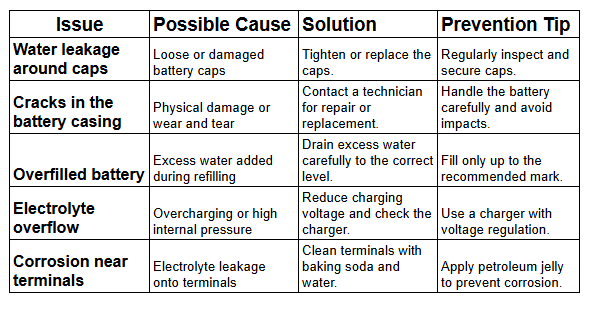
Read more....How to Maintain Your Inverter Battery for Longevity
Steps to Fix or Address the Problem
Once you’ve assessed the damage, take the following actions to fix the issue:
Refill with Distilled Water:
- If the electrolyte levels are low, carefully add distilled water to the battery cells up to the recommended level. Avoid overfilling.
Repair or Replace Faulty Components:
- Replace damaged vents or seals to prevent further leakage. Seek professional help if needed.
Check and Adjust Charging Settings:
- Ensure your inverter’s charging system is configured correctly to avoid overcharging. Consult the manufacturer’s guidelines or a technician.
Professional Inspection:
- If the battery shows significant damage, such as cracked casings or excessive corrosion, consult a professional technician for repairs or replacement.
Taking these steps promptly can restore your battery’s performance and prevent further issues.
Epochem Distilled Water 20 Liters
Preventing Future Leaks
To avoid recurring issues with water leakage, implement the following preventive measures:
Regular Maintenance:
- Check water levels and top up with distilled water periodically. Avoid letting the levels drop too low.
Avoid Overcharging:
- Use a charger with overcharge protection to prevent excessive heat buildup.
Inspect Vents and Seals:
- Regularly check vents and seals for wear or damage. Replace them as needed.
Stable Placement:
- Ensure the battery is placed on a stable, flat surface to prevent physical damage or leakage.
By following these guidelines, you can significantly reduce the risk of water leakage and prolong the life of your inverter battery.
Kan 12v. 220AH Solar Tubular Battery
Frequently Asked Questions
1. What should I do if my battery keeps leaking despite repairs?
Persistent leakage may indicate severe internal damage. It’s best to consult a professional technician or replace the battery entirely.
2. Can I use tap water instead of distilled water for my inverter battery?
No, tap water contains minerals and impurities that can harm the battery’s performance and cause further damage.
3. How often should I check the water levels in my inverter battery?
Check the water levels every 2-3 months or as recommended by the manufacturer.
4. What are the signs that my inverter battery is overcharging?
Excessive heat, a strong smell, or frequent water loss are common indicators of overcharging.
5. Is it safe to use my inverter during a battery leak?
No, operating the inverter with a leaking battery poses safety risks. Disconnect the battery and address the issue first.
Related Articles
The Dangers of Using Tap Water in Your Inverter Battery
How Distilled Water Powers Up Your Inverter Battery
Why Use Distilled Water For Inverter Battery
Conclusion
Dealing with a leaking inverter battery is crucial to maintaining the efficiency and safety of your power backup system. Identifying the cause, taking immediate action, and implementing preventive measures can help address the issue effectively. Regular maintenance and professional guidance ensure your inverter battery remains in top condition, providing uninterrupted power when you need it most. For trusted products and expert support, turn to GZ Industrial Supplies your reliable partner in power solutions.
Recent Posts
-
What is the Difference Between 11KV and 33KV Power Transformer Lines?
Introduction As an electrical engineer or utility professional, you likely handle a variet …Apr 10, 2025 -
Top 10 Industrial Hubs in Nigeria: A Guide for Suppliers and Manufacturers
Introduction Nigeria, Africa's largest economy, boasts a diverse and rapidly growing industrial …Apr 10, 2025 -
Which Generator is Best for Home use in Nigeria 2025
Unstable power supply is a reality many Nigerian households contend with daily. Whether it&rsqu …Apr 09, 2025


